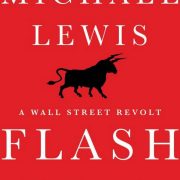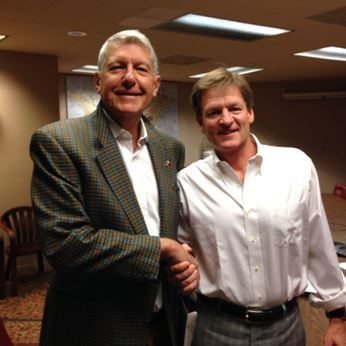The Markets Are Not Rigged
I recently read? ?Flash Boys?, Michael Lewis?s bestseller about high frequency trading.
In it, Lewis claims the markets are ?rigged? for the ordinary investor, and they are getting ripped off, in effect, paying a giant ?tax? to Wall Street to get their trades done.
Nothing could be further from the truth.
I have known Michael for 25 years, back when he was a wet behind the ears bond salesman at the former Salomon Brothers (now owned by Citigroup).
When he published an autobiographical recitation of his year there in 1989, a lot of people thought that I was him publishing under a pseudonym. It was only after he started making media appearances that this misunderstanding was resolved (he is a lot shorter than me).
Michael is first and foremost a storyteller. His previous books were about baseball (Moneyball), fatherhood (Home Game), and Silicon Valley (The New New Thing), as well as an assortment of financial topics, all entertaining endeavors.
The important thing is that these are stories intended to entertain. They are not documentaries. ?Flash Boys? has a coherent story line, a timeline, a good guy, lots of bad guys, and even a happy ending. Michael has certainly honed his craft over the decades.
The hero, Canadian Brad Katsuyama of RBC, embarks on a crusade to discover the truth behind HF trading. He discovers a viper?s nest of greedy, dishonest, and often foreign programmers lining their pockets at the public?s expense.
He comes to the revelation that if he created his own exchange where everyone was honest, victimized customers would flock to it in droves. He does, they do, and the angels sing. The Investor?s Exchange becomes a runaway success. Bring on the closing credits.
I calculate that Lewis should earn about $22.5 million pretax on this venture (5 million books X $30 X 15%), which explains why he has such a nice home next door to me in the Berkeley Hills.
If you want to learn about high frequency trading, you will pick up a few salacious details.
You will learn that a company backed by Netscape founder Jim Barksdale spent $300 million to lay a fiber optic cable from Chicago to New York just to shave a few milliseconds off order execution times.
One HF firm hasn?t had a losing trade in five years. Oh, and they tend to say F*** a lot on Wall Street. Big revelation!
But you will gain anything but the history, the broader picture, or how HF trading actually works. There are far better books around that do that, such as ?Dark Pools?, by Scott Patterson. But it?s a boring read.
In fact, the stock markets are miles away from being rigged. The Wall Street tax is the smallest it has ever been. When I first started in the business in the early seventies, it cost 25 cents to get one share done.
Today the cost is infinitesimally small. It was the collapse of order execution costs that made services like the Diary of a Mad Hedge Fund Trader possible. My strategies don?t work with the big-ticket commissions of yore.
Wall Street has been shrinking dramatically for the past eight years, faster than almost any other American industry, except for maybe newspapers and coal. The profits are just not there to support the enormous staffs of the past.
If you don?t believe me, just try to get your kid a job in the industry. No one will touch them without five years of experience.
Notice that the brokers don?t have the yachts anymore. Today, they are all owned by hedge fund managers and private equity guys, and the boats are a lot bigger.
I think the whole HF thing has been wildly exaggerated by the media. It was a slow news day when the book came out, and the networks were desperate to say anything. Vladimir Putin invading another country is not exactly new news.
No one really knows how much these people make. The current rumored figure for the bunch is anywhere from $1-$10 billion a year. This compares to the present market capitalization of American equities at $23 trillion.
In other words, it?s peanuts. We?re really looking at a tempest in a tea cup here.
There are no public firms where we can dig into financials, and the big banks hide all their HF income under a ?miscellaneous? item in their income statements (I looked). Who knows what goes on in dark pools? That's the point.
If these firms were really the printing presses they claim, where are all the listed companies? Wouldn?t owners want to claim the IPO premium and sell out for a high multiple of book value?
Virtu Financial was just about to go public, but the deal was postponed when the market fell apart.
I was offered an opportunity to back a start up that was a precursor to HF in the nineties. Back then, they were exploiting trapdoors in the exchange execution software that had been inadvertently left open by the original designers. I studied the business model carefully.
They needed $15 million in up front capital, and an additional annual operating budget of another $15 million. There was a risk that the anomaly they were exploiting could disappear at any time. The regulators could declare their activities illegal.
Congress could tax them out of existence if they attracted too much attention, as they did in Japan. The Internet could go down, trapping them in losing positions. Or someone could just accidentally kick the plug for the computer out of the wall socket.
Having lived through multiple technology collapses here in Silicon Valley, I can tell you that used high-end computers fetch about 20 cents on the dollar. Used desks fetch about 5 cents. The safety net is a long ways down.
All of this to earn 0.1 cent on a trade? If I have the ability to earn 100% on a single trade, which I do, then why commit enormous amounts of capital and weather unknown risks just to make 0.00001%?
In the end, I decided that you would only want to engage in HF trading if you couldn?t do anything else to make money in the markets.
I passed.
The bottom line here is that high frequency trading carries far more risk than is portrayed to the public, and than they may even understand themselves.
Just ask the former owners of Knight Capital, who lost $442 million in a single day due to a software glitch and had to be diluted out of existence to keep from going under. That?s a lot of tenths of cents.
A software glitch! When I have a software glitch, my TiVo doesn?t work or my alarm clock doesn?t go off on time. I don?t lose well into 11 figures, get financially wiped out, and threaten the stability of the financial markets!
The sad thing here is that when the big exchanges went public in 2006 their focus shifted from serving the public to satisfying their own shareholders. The interest of the little guy got tossed out the window. There really is no one looking after the welfare of the general public in the marketplace today.
It?s every man for himself.
To buy??Flash Boys: A Wall Street Revolt??at Amazon, please click here.





